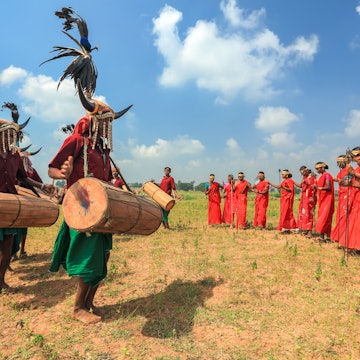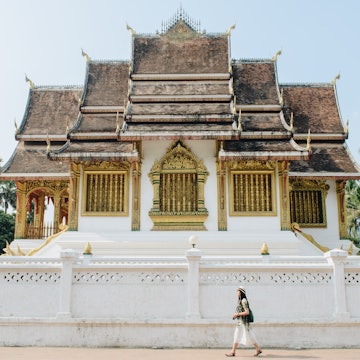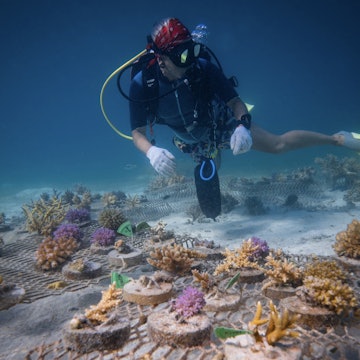

To get a taste of Bhutan’s singular culture and natural beauty, start with these top destinations. Wout Kok/Shutterstock
Mural-filled monasteries, snow-crowned peaks, ancient fortresses and tranquil Buddhist villages edged by chili farms – the stunning beauty of Bhutan is visible around every turn of its hairpin roads. As part of the country's "high value, low volume" tourism model, there's a fixed daily tourist fee of US$100, but the rewards speak for themselves.
Internationally famous for its commitment to “Gross National Happiness” and its carbon-negative status, Bhutan has worked hard to protect its unique culture and natural beauty. Nearly 70% of the country is blanketed in dense pine, oak and rhododendron forests, the country is rich in outdoor activities and charming villages showcase an undiluted Buddhist culture fast vanishing from other parts of the Himalayas.
While it can take hours of travel by road to reach each destination, the scenic drives (and those hair-raising bends) are all part of the experience of visiting this truly special place. For anyone interested in Himalayan scenery, mountain trekking, Buddhist spirituality and more, here are our picks for the best places to add to your Bhutan itinerary.

1. Paro
Best for hitting Bhutan’s highlights
Travelers careen between steep mountain slopes before their aircraft touches down at Paro International Airport, the gateway to the “Land of the Thunder Dragon.” Less than 10 minutes from the airport lies the historic riverside town of Paro, known for its National Museum, the dramatic Paro Dzong fortress and iconic Taktshang Goemba (Tiger’s Nest Monastery), accessible via a 6.4km (4-mile) hike.
Paro town is a place you will – and must – visit. Take time to wander the streets and visit the Paro Weekend Market to peruse shops and stalls selling Himalayan honey and handmade souvenirs. When you’ve worked up an appetite, stop into any number of restaurants – we rate Momo Corner for fresh, handmade momo dumplings.
Planning Tip: As the setting for Bhutan's only international airport, Paro is usually the first or last stop on any Bhutan traveler’s itinerary. Whether you’ve just arrived or are wrapping up your trip, hire a car and a guide to take in the historical and religious sights spread around the Paro Valley.

2. Thimphu
Best for a taste of Bhutanese city life
Bhutan’s capital city beautifully combines culture with a cosmopolitan vibe. Spend the day creating your own stamps at the Bhutan Postal Museum, touring the massive Trashi Chho Dzong, circumnavigating the National Memorial Chorten and watching immaculately dressed policemen manually direct traffic (there are no traffic lights in the entire country).
When the sun dips below the mountains, enjoy the nightlife at bars and clubs such as Mojo Park and the Grey Area, a popular art bar with live music where you can chat with locals over a bottle or two of Bhutanese Red Panda beer or a glass of ara (a spirit distilled from rice).
Planning Tip: Be sure to take a walk in the hills around the capital. For an easy taster, a lovely, level walking trail follows the west side of the valley, linking the BSS communications tower to Wangditse Goemba.

3. Punakha
Best for experiencing rural life
Ringed by rustic riverside farms where cows graze among rice and chili fields, Punakha is one of the most beautiful places in Bhutan – home to what is arguably the country's most spectacular dzong (monastery-fortress), sitting majestically beside the sacred confluence of two rivers.
Life in Punakha revolves around the rivers that meet at its heart. For the best river views, take a short walk from Punakha Dzong to one of the country’s largest suspension bridges, wrapped with fluttering prayer flags. Travelers can also go white-water rafting over the rapids of the Po Chhu and Mo Chhu rivers.
Planning Tip: Punakha’s low elevation (1242m/4075ft) means that temperatures tend to be warmer than in nearby towns and districts – you’ll need fewer layers and more sunscreen.

4. Khoma
Best for discovering traditional textiles
Adventurous travelers can peek behind the curtain – or perhaps that should be shawl – in Khoma, Bhutan’s textile hub. In the eastern district of Lhuentse, this village is home to roughly 100 residents and zero cars, and local artisans spend their days weaving ornate patterns and traditional Buddhist motifs on wooden looms, using dyes made from minerals and plants harvested in the area.

5. Phobjikha Valley
Best for outdoor activities and birdlife
Drive past mountain meadows dotted with yaks to reach one of Bhutan’s most sacred places. Tranquility and peace emanate from the Phobjikha Valley and its main attraction, Gangte Goemba, a 17th-century monastery gazing out over the valley’s fertile farmland. This is also one of the easiest places to spot endangered black-necked cranes.
The monastery is gorgeous but it's Gangte’s natural beauty that really stands out. You can hike myriad trails, many with relatively flat stretches where you can focus on the views rather than exertion. Archery, mountain biking, camping, birding and picnics are other popular activities.
Planning Tip: Naturalists should aim to visit between late October and mid-March to see the elegant black-necked cranes that gather here on their migration route from Tibet.

6. Dochu La
Best for a pit stop with a view
We’ll bet you 100 Bhutanese ngultrum that this scenic rest stop will make an appearance on your Bhutan itinerary. Hailed as one of the best lookouts in Bhutan, this mountain pass lies on the route from Thimphu to Punakha, and almost everyone traveling on this road pauses to admire the view.
On a clear day, sparkling views of Himalayan peaks await, and the pass is marked by 108 stupas – a sacred number in Buddhism – honoring the Royal Bhutanese soldiers who died battling Assamese insurgents in 2003. On the opposite side of the road, stop into the dainty Druk Wangyal Lhakhang then visit the restaurant at the pass for coffee, cakes and momos.
7. Laya
Best for off-the-beaten-track adventures
The arduous seven-hour drive from Thimphu to Gasa only takes you part of the way to this remote northwestern village. From Gasa, you’ll strap on your hiking boots and trek for three to five hours uphill to the highest permanently occupied village in the country.
But the views of the Himalayan peaks are worth it. Home to the Indigenous Layap people, this pedestrian-only village is filled with yak herders, collectors of cordyceps (an insect-infecting fungus hailed as an aphrodisiac) and elders who honor ancient traditions.
Planning Tip: Try to arrange your trip to coincide with the famous Royal Highland Festival in late October, when you’ll witness one of Bhutan’s most culturally unique events, marked by livestock contests, dancing and traditional songs.

8. Bumthang
Best for spirituality seekers
This centrally located and mountainous district is also one of the country’s most spiritual quarters. Spread over four valleys, important sites include Jampey Lhakhang, a historic 7th-century Buddhist temple, and the Jakar Dzong, an auspicious fortress built in 1549.
Rest your legs and indulge in some fresh cheese and jams at the Bumthang Swiss Cheese factory, followed by a local beer next door at the brewery that produces Red Panda beer. The Bumthang Jakar Tsechu festival in October/November is one of Bhutan's most colorful celebrations, featuring evocative masked dances.
Planning Tip: The drive from Thimphu to Bumthang takes many hours over often treacherous roads. If you’re pressed for time – or prone to motion sickness – consider a domestic flight to Bumthang's tiny airport from Paro.
9. Haa Valley
Best for immersing yourself in nature
While there’s no shortage of postcard-worthy vistas in Bhutan, the Haa Valley is in a league of its own. Close to the China–India border, about three hours from Paro, you’ll find some of the country’s most spectacular hiking trails, which meander through lush green valleys and monastery-dotted villages.
Covered in alpine forests and jagged mountain peaks, this small section of the country is also one of the most unspoiled. Travelers can take off on the one-day Haa Panoramic Hiking Trail or the three-day Sagala Trek, or simply sit by the Haa River and take in 360-degree views of pristine nature.














